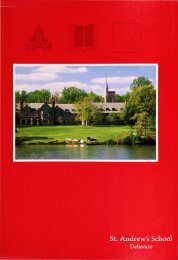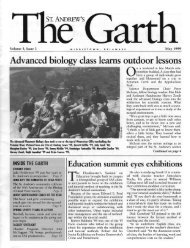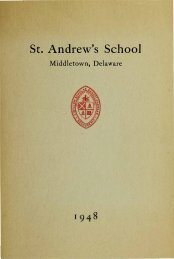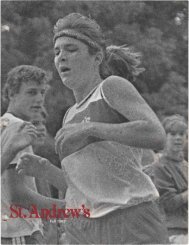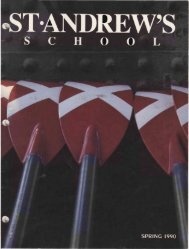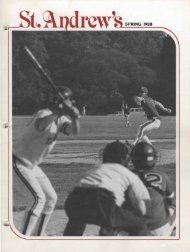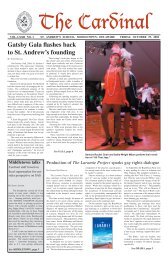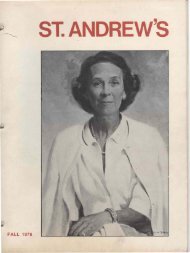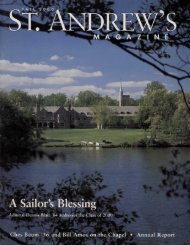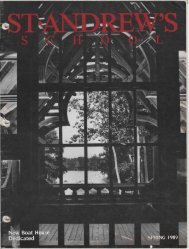Untitled - Saint Andrew's School Archive - St. Andrew's School
Untitled - Saint Andrew's School Archive - St. Andrew's School
Untitled - Saint Andrew's School Archive - St. Andrew's School
You also want an ePaper? Increase the reach of your titles
YUMPU automatically turns print PDFs into web optimized ePapers that Google loves.
RELIGIOUS STUDIES<br />
Since we recognize that students<br />
come to <strong>St</strong>. <strong>Andrew's</strong><br />
from a number of different<br />
backgrounds and traditions,<br />
our Religious <strong>St</strong>udies curriculum<br />
aims to examine the Christian religion<br />
from both a historical and academic<br />
point of view. While the<br />
courses themselves do not require<br />
commitment to any one set of beliefs,<br />
our concern is that personal<br />
decisions in matters of faith should<br />
be informed choices, based on careful<br />
thought and an intelligent understanding<br />
of what Christian commitment<br />
involves.<br />
Thus the course at the IV Form<br />
level covers the major parts of the<br />
Bible, the life and teachings of Jesus,<br />
the nature of man and his world, and<br />
the understanding of Christianity as<br />
a religion in which revelation occurs<br />
through historical events and persons.<br />
Some attention is also gi·;en to<br />
the moral implications of Christian<br />
commitment for contemporary life.<br />
The VI Form courses examine various<br />
aspects of the Christian faith<br />
and life in the light of philosophy,<br />
psychology and social dynamics.<br />
The aim here is to introduce students<br />
to some of the many varied<br />
ideas and theologies they will<br />
encounter in college, and to provide<br />
an intellectual structure for Christian<br />
belief. An attempt is made during<br />
this year to help the students formulate<br />
their own value systems<br />
through discussions and essays<br />
and to expose them to some of the<br />
important writers and thinkers<br />
of western J udeo-Christian culture.<br />
History & Literature of the<br />
Old and New Testaments<br />
he content of this course covers<br />
major themes of the Bible. Selec<br />
from the Old Testament<br />
Ttions and<br />
interpretive texts trace the history of the<br />
people of Israel and their developing<br />
understanding of the nature of their God<br />
and their covenant relationship with<br />
Him. The readings from and about the<br />
New Testament emphasize the life and<br />
teachings of Jesus as found in the Gospels,<br />
as well as selections from the<br />
Epistles of <strong>St</strong>. Paul. The growth and<br />
spread of Christianity during the first<br />
century are studied in the Acts of the<br />
Apostles. The final unit of the course is<br />
devoted to contemporary books, sometimes<br />
a novel, sometimes a biography, in<br />
an attempt to illustrate how the issues<br />
and problems raised by the Biblical<br />
writers are still faced by people today.<br />
Texts: The New English Bible; Charpentier,<br />
How to Read The Old Testament; Link, The<br />
Sroenth Tru mpet. (IV Fonn)<br />
Health and Human<br />
Potential<br />
his course, which meets twice per<br />
week for half the school year,<br />
Tfocuses on self-esteem, physical<br />
and emotional health care, decision<br />
making, values clarification and coping<br />
skills. Discussions and experiential<br />
exercises are aimed to give students a<br />
better understanding and acceptance of<br />
themselves, others and the changing<br />
world in which they live. Journal writing,<br />
roleplaying, films and current research<br />
are used to explore critical issues such as<br />
drugs, alcohol, sexuality, changing relationships,<br />
stress and specific adolescent<br />
concerns. (IV Fom1)<br />
Ethics<br />
his introduction to ethics studies<br />
human behavior and values such<br />
Tas right and wrong, good and evil.<br />
The course examines the basis of natural<br />
morality and how various ethical systems<br />
have been developed. Ethical judgments<br />
are explored through discussion of case<br />
studies, and the Spring Term is devoted<br />
to oral presentations and the writing of a<br />
research paper on an issue of contemporary<br />
social concern. (Elective minor; V and<br />
VI Fonn)<br />
An Introduction to<br />
Philosophy<br />
T he aim of this unit is to introduce<br />
students to philosophical thinking<br />
in the western tradition. Questions<br />
such as-What is the nature of reality?<br />
and How can we know it?-are traced<br />
from the age of the Pre-Socratics, Plato,<br />
and Aristotle down to the religious and<br />
scientific questions of the modern world.<br />
A short unit on ethics is included. Text:<br />
Hollis, Invitation to Ph ilosophy. (VI Fonn,<br />
Fall Tenn)<br />
*IN THE WINTER AND SPRING TERMS,<br />
VI FORM STUDENTS CHOOSE ONE<br />
OF THE FOLLOWING ELECTIVES.<br />
*Psychological Perspectives<br />
on Human Behavior<br />
he student is encouraged to think<br />
about the dynamics of human be<br />
and to consider<br />
Thavior various<br />
classical and contemporary views of<br />
human personality. The course concentrates<br />
on the following issues: religious,<br />
philosophical and psychological views of<br />
human personality and behavior; the<br />
nature/nurture discussion, with reference<br />
to behaviorist and psychoanalytic<br />
points of view; the causes of aggression;<br />
guilt, religious, moral and psychological<br />
perspectives. Freudian and other theories<br />
of human development will be discussed.<br />
Authors read will include Fromm, The<br />
Anatomy of Human Destructiveness; Berne,<br />
Games People Play; Festinger, When Prophecy<br />
Fails; and some shorter articles and papers.<br />
(VI Fonn-Winter and Spring Tem1s)<br />
*Sociological Perspectives<br />
on Human Communities<br />
eople seem to have a universal<br />
need to live in some kind of community.<br />
This course looks at<br />
P<br />
some<br />
ot the forms that the search for community<br />
has taken in the Western World; it<br />
examines some utopian schemes springing<br />
from dissatisfaction with existing<br />
conditions and some groups which have<br />
been established to put into practice<br />
particular ideals of community. Readings<br />
include parts of Plato's Republic, The Acts<br />
of The Apostles, The Rule of <strong>St</strong>. Benedict,<br />
More's Utopia, Skinner's Walden Two,<br />
Kanter's Commitment ami Community,<br />
Huxley's Brave New World, and Callenback's<br />
Ecotopia. (VI Fonn-Winter and<br />
Spring Tem1s)<br />
32



